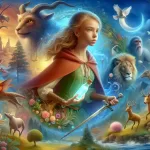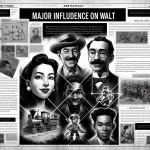-
Indice dei contenuti
“Endless anticipation and existential reflection: Waiting for Godot explores the absurdity of life and the search for meaning.”
“Waiting for Godot,” a seminal play by Samuel Beckett, explores the existential themes of waiting, uncertainty, and the human condition. Set in a desolate landscape, the narrative revolves around two main characters, Vladimir and Estragon, who engage in seemingly meaningless conversations while they await the arrival of a figure named Godot, who never appears. The play delves into themes of hope, despair, and the absurdity of life, highlighting the struggle for meaning in an indifferent universe. Through its minimalist setting and rich symbolism, “Waiting for Godot” challenges audiences to reflect on the nature of existence and the passage of time, making it a cornerstone of modernist literature.
Summary of Waiting for Godot
“Waiting for Godot,” a seminal work by Samuel Beckett, is a play that delves into the complexities of human existence through the lens of absurdism. The narrative unfolds in a desolate setting, characterized by a barren tree and a road that seems to lead nowhere. The story revolves around two main characters, Vladimir and Estragon, who engage in a series of conversations while they wait for a figure named Godot, who never arrives. This waiting becomes a central motif, symbolizing the human condition and the existential quest for meaning.
As the play progresses, the interactions between Vladimir and Estragon reveal their deep-seated anxieties and insecurities. Estragon frequently grapples with his identity and purpose, often expressing a desire to leave but ultimately remaining tethered to Vladimir. This dynamic illustrates the interdependence of the two characters, as they rely on each other for companionship and a semblance of purpose in their otherwise aimless existence. Their dialogues oscillate between humor and despair, highlighting the absurdity of their situation while also reflecting the broader human experience of waiting for something that may never come.
The arrival of two other characters, Pozzo and Lucky, further complicates the narrative. Pozzo, a pompous and domineering figure, treats Lucky, his servant, with cruelty and disdain. Their relationship serves as a commentary on power dynamics and the nature of human relationships. Pozzo’s need for control and Lucky’s subservience create a stark contrast to the bond shared by Vladimir and Estragon, emphasizing the varying degrees of dependence and autonomy that exist within human interactions. As Pozzo and Lucky’s roles shift throughout the play, the audience is prompted to consider the fluidity of power and the arbitrary nature of social hierarchies.
Throughout the play, the theme of time is intricately woven into the fabric of the narrative. The characters’ perception of time is distorted; they often struggle to recall past events or anticipate the future. This disorientation reflects the existential notion that time may be an illusion, further underscoring the futility of their waiting. The repetitive nature of their conversations and actions reinforces the idea that life is a cycle of waiting and uncertainty, devoid of clear purpose or direction.
Moreover, the play’s minimalist setting and sparse dialogue contribute to its overarching themes of existentialism and absurdism. The lack of a traditional plot structure forces the audience to confront the inherent meaninglessness of existence. As Vladimir and Estragon wait for Godot, they engage in philosophical musings that challenge the audience to reflect on their own lives and the nature of hope. The ambiguity surrounding Godot’s identity and the reason for their wait invites various interpretations, allowing the play to resonate with a diverse audience.
In conclusion, “Waiting for Godot” serves as a profound exploration of the human condition, encapsulating themes of waiting, existential uncertainty, and the complexities of human relationships. Through the interactions of its characters and the starkness of its setting, Beckett crafts a narrative that transcends time and place, inviting audiences to ponder the nature of existence itself. The play remains a cornerstone of modern theater, challenging viewers to confront the absurdity of life while simultaneously finding solace in shared experiences of waiting and uncertainty.
Key Themes in Waiting for Godot
In Samuel Beckett’s “Waiting for Godot,” the exploration of key themes is central to understanding the play’s profound impact on literature and philosophy. One of the most prominent themes is the absurdity of human existence. The characters, Vladimir and Estragon, engage in seemingly meaningless conversations and repetitive actions, which reflect the futility of their wait for the elusive Godot. This absurdity is not merely a narrative device; it serves as a commentary on the human condition, suggesting that life itself may lack inherent meaning. As the characters grapple with their existential plight, they embody the struggle to find purpose in a world that often appears indifferent to their suffering.
Another significant theme is the passage of time and its implications for human experience. Throughout the play, time is portrayed as both cyclical and stagnant. The characters wait for Godot, who never arrives, leading to a sense of endlessness that permeates their existence. This waiting becomes a metaphor for the human experience of time, where moments blend into one another, and the future remains uncertain. The repetition of dialogue and actions emphasizes this theme, as the characters find themselves caught in a loop, unable to escape their circumstances. This cyclical nature of time raises questions about the nature of hope and despair, as Vladimir and Estragon oscillate between moments of optimism and resignation.
Moreover, the theme of friendship and companionship is intricately woven into the fabric of the play. The relationship between Vladimir and Estragon serves as a lifeline in their bleak reality. Despite their differences and occasional conflicts, their bond provides a semblance of comfort in the face of existential dread. This theme highlights the importance of human connection, suggesting that even in a seemingly meaningless world, relationships can offer solace and support. The interplay between the two characters illustrates the complexities of friendship, as they navigate their shared experience of waiting and uncertainty together.
Additionally, the theme of identity and self-perception emerges as a crucial aspect of the narrative. Throughout the play, both Vladimir and Estragon grapple with their sense of self, often questioning their existence and purpose. Their interactions reveal a fluidity in identity, as they oscillate between moments of clarity and confusion. This theme invites the audience to reflect on the nature of identity itself, suggesting that it is not a fixed entity but rather a construct shaped by experiences and relationships. The characters’ struggles with their identities resonate with the broader human experience, prompting introspection about the essence of self in an unpredictable world.
Finally, the theme of hope and despair is intricately linked to the characters’ waiting. While they cling to the hope that Godot will eventually arrive, this hope is continually undermined by the reality of their situation. The tension between hope and despair creates a poignant dynamic, as the characters oscillate between moments of anticipation and disillusionment. This duality reflects the broader human experience, where hope can be both a source of strength and a potential pathway to disappointment. In this way, Beckett masterfully captures the complexities of the human psyche, inviting audiences to confront their own feelings of hope and despair in the face of uncertainty.
In conclusion, “Waiting for Godot” delves into profound themes that resonate with the human experience. Through its exploration of absurdity, time, friendship, identity, and the interplay of hope and despair, the play invites reflection on the nature of existence itself. Beckett’s work remains a powerful testament to the complexities of life, encouraging audiences to engage with the fundamental questions that define the human condition.
Character Analysis of Vladimir and Estragon
In Samuel Beckett’s “Waiting for Godot,” the characters Vladimir and Estragon serve as the central figures around which the play’s existential themes revolve. Their dynamic relationship is marked by a blend of companionship and conflict, reflecting the human condition’s inherent absurdity. Vladimir, often referred to as Didi, embodies a more philosophical outlook, frequently engaging in contemplative dialogue about existence, time, and the nature of hope. In contrast, Estragon, or Gogo, represents a more instinctual and pragmatic approach to life, often preoccupied with immediate physical needs and discomforts. This dichotomy between the two characters not only highlights their individual personalities but also underscores the broader themes of the play.
As the narrative unfolds, Vladimir’s role as the more articulate and reflective character becomes evident. He often attempts to maintain a sense of purpose and meaning in their bleak situation, frequently reminding Estragon of their commitment to wait for Godot. This insistence on waiting can be interpreted as a metaphor for humanity’s search for meaning in an indifferent universe. Vladimir’s philosophical musings, however, are often met with Estragon’s skepticism and impatience, which serves to ground their conversations in a more tangible reality. Estragon’s frequent complaints about his boots and his desire for physical comfort illustrate a more immediate concern for survival, contrasting sharply with Vladimir’s abstract ponderings.
Moreover, the interplay between Vladimir and Estragon reveals the complexities of their friendship. Their relationship oscillates between moments of tenderness and tension, showcasing the dependency they have on one another. For instance, when Estragon expresses a desire to leave, Vladimir’s insistence on waiting highlights the fear of abandonment that permeates their bond. This dependency is further complicated by their frequent arguments, which often dissolve into playful banter, suggesting that their connection is both a source of comfort and a cause of frustration. This duality reflects the broader human experience of seeking companionship while grappling with the inherent loneliness of existence.
Transitioning from their individual characteristics to their collective dynamic, it becomes clear that Vladimir and Estragon represent two sides of the same existential coin. Their conversations often circle back to the themes of time and memory, with Vladimir recalling past events and Estragon struggling to remember them. This disparity in memory serves to emphasize the play’s exploration of the fluidity of time and the futility of human attempts to impose order on it. As they wait for Godot, their discussions reveal a profound sense of disorientation, suggesting that the act of waiting itself may be more significant than the arrival of any external savior.
In conclusion, the character analysis of Vladimir and Estragon in “Waiting for Godot” reveals a rich tapestry of existential themes woven through their interactions. Their contrasting personalities and the complexities of their relationship serve to illuminate the absurdity of the human condition. As they navigate their bleak reality, the interplay between hope and despair, companionship and isolation, ultimately encapsulates the essence of Beckett’s exploration of existence. Through Vladimir and Estragon, the audience is invited to reflect on their own experiences of waiting, searching for meaning, and the intricate dance of human relationships in an unpredictable world.
The Role of Lucky in Waiting for Godot
In Samuel Beckett’s “Waiting for Godot,” the character of Lucky serves a multifaceted role that is crucial to the play’s exploration of existential themes and the human condition. Lucky is introduced as the servant of Pozzo, a pompous and domineering figure who embodies the absurdity of power dynamics. From the outset, Lucky’s presence is marked by a sense of subservience, yet his character transcends mere servitude, becoming a poignant symbol of the struggle for meaning in a seemingly indifferent universe.
One of the most striking aspects of Lucky’s character is his silence and the burden of his labor. When he first appears, he is tethered to Pozzo by a rope, which serves as a physical representation of his subjugation. This imagery evokes a sense of entrapment, suggesting that Lucky is not only bound to Pozzo but also to the expectations and demands of society. However, it is during the famous “thinking” scene that Lucky’s character reveals deeper layers. When he finally speaks, his monologue is a chaotic torrent of words that reflects the confusion and fragmentation of thought in a world devoid of clear meaning. This outburst can be interpreted as a desperate attempt to assert his individuality and intellect, albeit in a manner that is ultimately nonsensical. The juxtaposition of his silence and the overwhelming verbosity of his speech underscores the struggle between the desire for expression and the futility of communication.
Moreover, Lucky’s relationship with Pozzo highlights the theme of dependency and the complexities of human relationships. Pozzo’s treatment of Lucky oscillates between cruelty and care, illustrating the often arbitrary nature of power. This dynamic raises questions about the nature of freedom and the extent to which individuals are willing to compromise their autonomy for the sake of companionship or survival. Lucky’s obedience and willingness to endure Pozzo’s whims can be seen as a reflection of the human tendency to cling to familiar structures, even when they are oppressive. In this sense, Lucky embodies the paradox of existence: the simultaneous yearning for liberation and the comfort found in submission.
As the play progresses, Lucky’s character also serves as a mirror to the protagonists, Vladimir and Estragon. While they wait for Godot, who symbolizes hope and meaning, Lucky’s existence raises the question of whether waiting itself is a form of existence or merely an exercise in futility. His presence challenges the audience to consider the implications of waiting and the nature of time. Unlike Vladimir and Estragon, who engage in dialogue and seek connection, Lucky’s silence and labor suggest a more profound resignation to the absurdity of life. This contrast emphasizes the varying responses individuals have to existential despair, with Lucky representing a more passive acceptance of his fate.
In conclusion, Lucky’s role in “Waiting for Godot” is integral to the play’s exploration of themes such as power, dependency, and the search for meaning. Through his complex relationship with Pozzo and his poignant moments of silence and speech, Lucky embodies the struggle inherent in the human experience. His character invites the audience to reflect on the nature of existence, the burdens of communication, and the often absurd quest for purpose in a world that offers little in the way of answers. Ultimately, Lucky serves as a reminder of the intricate interplay between servitude and autonomy, illuminating the profound questions that lie at the heart of Beckett’s work.
The Significance of Pozzo in the Play
In Samuel Beckett’s “Waiting for Godot,” the character of Pozzo serves as a pivotal figure that embodies various themes and ideas central to the play. His presence introduces a complex dynamic between power, dependency, and the human condition, which resonates throughout the narrative. Pozzo, a self-proclaimed master, arrives with his servant Lucky, and their relationship immediately raises questions about authority and subservience. This master-servant dynamic is not merely a reflection of social hierarchies but also a commentary on the existential struggles faced by individuals in a seemingly indifferent universe.
As the play unfolds, Pozzo’s character reveals the absurdity of his authority. He often boasts about his power over Lucky, yet his need for Lucky’s labor and companionship underscores a paradoxical dependence. This relationship illustrates the theme of interdependence, suggesting that even those who appear to wield power are often reliant on others for their identity and purpose. Pozzo’s treatment of Lucky oscillates between cruelty and care, highlighting the complexities of human relationships. This duality invites the audience to reflect on the nature of power and the ethical implications of domination and submission.
Moreover, Pozzo’s character serves as a representation of the human condition itself. His grandiose proclamations and theatrical demeanor mask an underlying vulnerability. As he becomes increasingly disoriented and loses his sense of control, the audience witnesses the fragility of his authority. This deterioration is particularly evident in the second act, where Pozzo, now blind and helpless, becomes a stark contrast to his earlier self. This transformation emphasizes the transient nature of power and the inevitability of decline, reinforcing the play’s existential themes. The audience is compelled to confront the reality that all individuals, regardless of their perceived strength, are ultimately subject to the whims of fate and time.
In addition to his role as a master, Pozzo also embodies the theme of existential absurdity. His incessant need for validation and recognition reflects a broader human desire for meaning in a world that often appears chaotic and devoid of purpose. Pozzo’s dialogues are filled with nonsensical rhetoric, which serves to highlight the absurdity of his existence. His attempts to assert control over his environment and those around him ultimately lead to a sense of futility, mirroring the experiences of Vladimir and Estragon as they wait for Godot. This shared sense of waiting and uncertainty binds the characters together, illustrating the universal struggle to find meaning in an unpredictable world.
Furthermore, Pozzo’s interactions with Vladimir and Estragon reveal the complexities of human relationships in the face of existential despair. His presence disrupts the established rhythm of their waiting, forcing them to confront their own vulnerabilities and desires. The moments of camaraderie and conflict between Pozzo and the other characters serve to deepen the exploration of themes such as friendship, loyalty, and the search for identity. As Pozzo oscillates between moments of dominance and vulnerability, he becomes a mirror reflecting the struggles of all characters in the play.
In conclusion, Pozzo’s significance in “Waiting for Godot” extends far beyond his role as a mere character; he encapsulates the intricate themes of power, dependency, and the absurdity of existence. Through his interactions with Lucky, Vladimir, and Estragon, Pozzo invites the audience to engage with profound questions about the nature of authority, the human condition, and the search for meaning in a world marked by uncertainty. His character ultimately serves as a reminder of the complexities inherent in human relationships and the existential dilemmas that define our shared experience.
Existentialism in Waiting for Godot
In Samuel Beckett’s “Waiting for Godot,” existentialism emerges as a central theme that permeates the narrative, characters, and overall structure of the play. The essence of existentialism, which grapples with the meaning of existence and the absurdity of life, is vividly illustrated through the experiences of the two main characters, Vladimir and Estragon. Their perpetual waiting for the elusive Godot serves as a metaphor for the human condition, encapsulating the struggle to find purpose in a seemingly indifferent universe. This waiting is not merely a physical act; it symbolizes the existential plight of individuals who seek meaning in a world that offers none.
As the play unfolds, the characters engage in a series of conversations that reflect their inner turmoil and philosophical musings. Their dialogues often oscillate between hope and despair, highlighting the absurdity of their situation. For instance, Vladimir’s insistence on the importance of waiting for Godot contrasts sharply with Estragon’s more pragmatic approach, which often leads him to question the very nature of their existence. This dynamic between the two characters underscores the existential belief that individuals must confront the absurdity of life and make choices, even in the face of uncertainty.
Moreover, the repetitive structure of the play reinforces the existential theme. The cyclical nature of the events, where each act mirrors the previous one, emphasizes the futility of their waiting. This repetition serves to illustrate the concept of time as a relentless force that strips away meaning, leaving the characters trapped in a perpetual state of inaction. The audience is left to ponder the implications of this stagnation, as it reflects the broader human experience of grappling with the passage of time and the search for significance.
In addition to Vladimir and Estragon, the characters of Pozzo and Lucky further enrich the existential themes within the play. Pozzo, who initially appears to be a figure of authority and control, ultimately reveals the fragility of power and the arbitrary nature of social hierarchies. His relationship with Lucky, who is subservient and often mistreated, highlights the existential notion of dependence and the inherent absurdity of human relationships. The dynamic between these characters serves as a microcosm of the broader existential struggle, illustrating how individuals navigate their roles within a chaotic and often meaningless world.
Furthermore, the ambiguity surrounding Godot himself adds another layer of existential complexity to the play. Godot’s identity remains elusive, symbolizing the unattainable nature of meaning and purpose. The characters’ unwavering hope for Godot’s arrival reflects humanity’s innate desire for answers and reassurance in an uncertain existence. However, as the play progresses, it becomes increasingly clear that Godot may never arrive, prompting the audience to confront the uncomfortable reality of existence without definitive meaning.
In conclusion, “Waiting for Godot” serves as a profound exploration of existentialism, encapsulating the human experience of waiting, searching, and ultimately confronting the absurdity of life. Through the interactions of its characters and the repetitive structure of the narrative, Beckett invites the audience to reflect on their own existence and the quest for meaning in a world that often defies understanding. The play stands as a testament to the enduring relevance of existential thought, challenging individuals to embrace the uncertainty of life while seeking their own paths amidst the chaos.
The Impact of Time in Waiting for Godot
In Samuel Beckett’s “Waiting for Godot,” the impact of time is a central theme that permeates the narrative and shapes the characters’ experiences. The play unfolds in a seemingly timeless landscape, where the passage of time is both a source of anxiety and a catalyst for existential reflection. The characters, Vladimir and Estragon, find themselves in a perpetual state of waiting, which raises profound questions about the nature of time and its implications for human existence. This waiting is not merely a physical act; it is emblematic of a deeper philosophical inquiry into the meaning of life and the inevitability of death.
As the play progresses, the cyclical nature of time becomes increasingly apparent. The characters engage in repetitive dialogues and actions, suggesting that their lives are trapped in a monotonous loop. For instance, the arrival of Pozzo and Lucky introduces a temporary diversion, yet their presence does not alter the fundamental reality of waiting. Instead, it reinforces the idea that time is an unyielding force, indifferent to human desires and aspirations. The characters’ attempts to impose meaning on their waiting—through conversations, physical activities, or even contemplating suicide—highlight their struggle against the oppressive weight of time.
Moreover, the ambiguity of time in “Waiting for Godot” serves to amplify the existential themes that Beckett explores. The characters often grapple with the uncertainty of their situation, questioning whether Godot will ever arrive or if their waiting is in vain. This uncertainty reflects a broader existential dilemma: the search for purpose in a world that appears devoid of meaning. The fluidity of time in the play blurs the lines between past, present, and future, suggesting that human existence is characterized by a constant state of flux. As Vladimir and Estragon oscillate between hope and despair, they embody the human condition—caught in a relentless cycle of anticipation and disappointment.
The impact of time is further illustrated through the characters’ interactions with each other and their environment. The passage of time is marked by the changing light, the arrival of night, and the repetition of daily routines. Yet, despite these markers, the characters remain ensnared in their waiting. This paradox underscores the futility of their efforts to escape the confines of time. The arrival of night, for instance, serves as a reminder of mortality, yet it also offers a temporary reprieve from the burdens of consciousness. In this way, time becomes both a tormentor and a refuge, complicating the characters’ relationship with their own existence.
Ultimately, the impact of time in “Waiting for Godot” invites the audience to reflect on their own experiences of waiting and the passage of time. The play challenges conventional notions of linear time, suggesting that existence is not defined by a series of events but rather by the moments of waiting that punctuate life. In this sense, Beckett’s work transcends its immediate context, resonating with universal themes of hope, despair, and the search for meaning. As Vladimir and Estragon continue to wait, they embody the human struggle against the inexorable march of time, prompting viewers to confront their own perceptions of existence and the significance of waiting in their lives. Through this exploration, “Waiting for Godot” remains a poignant meditation on the complexities of time and the human condition, inviting reflection on the nature of existence itself.
DOMANDE E RISPOSTE
1. **What is the main plot of “Waiting for Godot”?**
– The play revolves around two characters, Vladimir and Estragon, who wait for someone named Godot, who never arrives. They engage in various conversations and encounters while waiting, exploring themes of existence and the passage of time.
2. **Who are the main characters in “Waiting for Godot”?**
– The main characters are Vladimir (Didi) and Estragon (Gogo), who represent different aspects of human experience. Other characters include Pozzo, a pompous man, and Lucky, his mistreated servant.
3. **What is the significance of Godot in the play?**
– Godot symbolizes hope and the search for meaning in life. His absence raises questions about faith, expectation, and the nature of existence.
4. **What are the major themes in “Waiting for Godot”?**
– Major themes include the absurdity of life, the nature of time, the search for meaning, friendship, and the human condition.
5. **How does the play address the concept of time?**
– Time in “Waiting for Godot” is cyclical and ambiguous, with characters experiencing repetitive actions and conversations, suggesting a lack of progress or change.
6. **What role does humor play in the play?**
– Humor serves as a coping mechanism for the characters, providing relief amidst the existential despair and highlighting the absurdity of their situation.
7. **What is the overall message of “Waiting for Godot”?**
– The play suggests that life may lack inherent meaning, and the act of waiting itself can be a profound experience, reflecting the human struggle to find purpose in an indifferent universe.In “Waiting for Godot,” the conclusion emphasizes the existential themes of absurdity and the human condition, highlighting the futility of waiting and the search for meaning in a seemingly indifferent universe. The characters, Vladimir and Estragon, embody the struggle against despair and the need for companionship, illustrating the complexities of friendship and the passage of time. Ultimately, the play leaves audiences with a sense of ambiguity, prompting reflection on the nature of existence and the choices we make while waiting for purpose or resolution.







